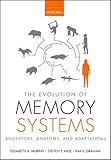The evolution of memory systems : ancestors, anatomy, and adaptations / Elisabeth A. Murray, Steven P. Wise, Kim S. Graham.
Material type: TextPublisher: Oxford, United Kingdom ; New York, NY : Oxford University Press, 2017Edition: First editionDescription: xvii, 496 pages, 6 pages of unnumbered plates : illustrations (some color) ; 26 cmContent type: text Media type: unmediated Carrier type: volumeISBN: 9780199686438; 0199686432Other title: Memory systemsSubject(s): Memory | Cognitive neuroscience | Human evolution | Primates -- Evolution | Brain -- Evolution | Primates -- Evolution | Human evolution | Brain -- Evolution | Memory | Cognitive neuroscience | Erinnerung | Gedächtnis | Memory -- physiology | Biological Evolution | Hominidae -- physiologyDDC classification: 153.1/2 LOC classification: BF371 | .M87 2017
TextPublisher: Oxford, United Kingdom ; New York, NY : Oxford University Press, 2017Edition: First editionDescription: xvii, 496 pages, 6 pages of unnumbered plates : illustrations (some color) ; 26 cmContent type: text Media type: unmediated Carrier type: volumeISBN: 9780199686438; 0199686432Other title: Memory systemsSubject(s): Memory | Cognitive neuroscience | Human evolution | Primates -- Evolution | Brain -- Evolution | Primates -- Evolution | Human evolution | Brain -- Evolution | Memory | Cognitive neuroscience | Erinnerung | Gedächtnis | Memory -- physiology | Biological Evolution | Hominidae -- physiologyDDC classification: 153.1/2 LOC classification: BF371 | .M87 2017| Item type | Current library | Call number | Copy number | Status | Notes | Date due | Barcode |
|---|---|---|---|---|---|---|---|
 Books
Books
|
Female Library | BF371 .M87 2017 (Browse shelf (Opens below)) | 1 | Available | STACKS | 51952000229599 | |
 Books
Books
|
Main Library | BF371 .M87 2017 (Browse shelf (Opens below)) | 1 | Available | STACKS | 51952000229582 |
Browsing Female Library shelves Close shelf browser

|

|

|

|

|

|

|
||
| BF353.5.C55 .L58 2012 Living in an environmentally traumatized world : healing ourselves and our planet / | BF353.5.C55 .L58 2012 Living in an environmentally traumatized world : healing ourselves and our planet / | BF371 .E525 2004 Fundamentals of cognitive psychology / | BF371 .M87 2017 The evolution of memory systems : ancestors, anatomy, and adaptations / | BF378.E94 .M55 2016 The neo-generalist : where you go is who you are / | BF39 .G427 2014 Straightforward statistics : understanding the tools of research / | BF39.5 .L46 2015 Database of dreams : the lost quest to catalog humanity / |
Includes bibliographical references and index.
The history of memory systems -- The history of the brain -- The reinforcement memory systems of early animals -- The navigation memory system of early vertebrates -- The biased-competition memory system of early mammals -- The manual-foraging memory system of early primates -- The feature memory system of anthropoids -- The goal memory system of anthropoids -- The goal and feature memory systems of hominins -- The social-subjective memory system of hominins -- The origin of explicit memory in hominins -- Deconstructing amnesia -- Reconstructing memory's past.
Current theories about human memory have been shaped by clinical observations and animal experiments. This doctrine holds that the medial temporal lobe subserves one memory system for explicit or declarative memories, while the basal ganglia subserves a separate memory system for implicit or procedural memories, including habits. Cortical areas outside the medial temporal lobe are said to function in perception, motor control, attention, or other aspects of executive function, but not in memory. The Evolution of Memory Systems' advances dramatically different ideas on all counts. It proposes that several memory systems arose during evolution and that they did so for the same general reason: to transcend problems and exploit opportunities encountered by specific ancestors at particular times and places in the distant past. Instead of classifying cortical areas in terms of mutually exclusive perception, executive, or memory functions, the authors show that all cortical areas contribute to memory and that they do so in their own ways-using specialized neural representations. The book also presents a proposal on the evolution of explicit memory. According to this idea, explicit (declarative) memory depends on interactions between a phylogenetically ancient navigation system and a representational system that evolved in humans to represent one's self and others. As a result, people embed representations of themselves into the events they experience and the facts they learn, which leads to the perception of participating in events and knowing facts.The Evolution of Memory Systems' is an important new work for students and researchers in neuroscience, psychology, and biology.
1 2

There are no comments on this title.